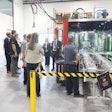Food fraud does not respect a crisis and the criminals who commit food fraud look for emerging supply chain vulnerabilities to exploit for financial benefits. Experts have identified an increasing trend in global food fraud during the Covid-19 pandemic, with the full extent unlikely to be seen for some time. Due to the nature of petfood, its raw materials and complex supply chains this might also have occurred in the petfood industry.
People often ask, why does food fraud matter in petfood? The answer is that it destroys trust in petfood industry ability to supply authentic products expected by pet owners. Premiumisation is an on-going market growth driver, with pet owners willing to pay more for “premium” including raw materials claims e.g., health & wellness benefits of botanicals; “organic”; specified sources e.g., Scottish salmon. Authenticity of these materials is therefore important.
Crucially, food fraud can result in a serious food safety failure as seen with the 2007 – 2008 melamine crisis. This occurred when a strategically important ingredient, wheat gluten, was adulterated with melamine resulting in artificially “high” protein content which commanded greater market price. Tragically, this resulted in the costliest petfood recall (>$42 million) and the deaths of around 2,000 cats and 2,200 dogs due to illness from consuming the adulterated ingredients.
To develop and maintain trust in petfood, many petfood manufacturers and ingredient suppliers implement GFSI (Global Food Safety Initiative) internationally accredited, 3rd party food safety management standards. These include all aspects of food integrity i.e., safety, legality, quality, and authenticity of food and standards like BRC, FSSC22000, IFS Food Standard and SQF all include the need for food fraud mitigation.
Food fraud mitigation strategies combine risk assessment and risk-based controls. For effectiveness, this requires management and continuous improvement of systems for vulnerability assessment, control measures, testing and horizon scanning to identify emerging risks. For many petfood manufacturers this is challenging on the basis of resources including time, trained people, and money.
To help petfood manufacturers overcome these challenges, “Food Forensics” and “Synergy Petfood” are delighted to announce their collaboration to offer support for pet food fraud mitigation. “Food Forensics”, established in the UK in 2011, offers a wide portfolio of services enabling companies to identify current and emerging food fraud vulnerabilities and implement targeted risk-based testing to confirm authenticity. “Synergy Petfood” is the trading name for “Synergy Food Ingredients Ltd” (SFI). SFI was established in 2006 as an independent dedicated petfood industry technical consultancy. SFI founder David Primrose has over 40 years global experience in the petfood industry specialising in raw materials risk management focusing on quality, authenticity, and safety.
This new collaboration enables petfood manufacturers, especially those based in the UK, to fulfil requirements on raw materials food fraud mitigation. This enables them to maintain pet owner trust, protect our pets and their businesses and fulfil the food fraud raw material and supply chain vulnerability requirements of GFSI food safety standards.
Please contact David Primrose at [email protected] or Rick Sanderson, Food Forensics Business Development Director at [email protected] to discuss how we can support your cost-effective food fraud mitigation strategy. www.foodforensics.co.uk www.synergy-petfood.com













